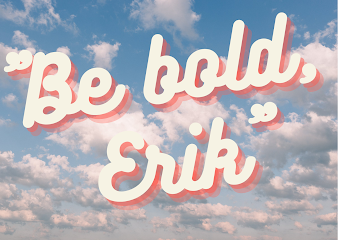“Be bold, Erik” are words from my next book, spoken by a boy
– that’ll be Erik – in order to prompt himself to act out of character. A small,
seemingly insignificant quote, and yet lately these words have become something
of a mantra to me while I write. My Erik’s fictional fight for self-belief is gently goading me into taking more risks in the
playground of story-making.
Weird is wonderful
Despite banging on at my own children to question everything
and embrace their weird as wonderful (cue eye-roll sigh and “Yes, we know, be yourself” before I even open my mouth), I’m
aware that in the past I’ve often trundled down the well-trodden path when it
comes to self-expression. I had a cautious childhood, peppered with parental
worrying and warnings and worst-case scenarios. I tried too hard to mask my stranger-things, to please and pretend so that I could get by at school, at work, without too much trouble; in effect, without being found out as odd.
Thing is, masking means developing some robust filters to disguise said strangeness. To create a
landing platform in my brain where I pause to check the social rulebook
so as to metaphorically not leave the house in my slippers. And it’s these filters that have been worrying me lately as I write – that I believe require an injection of young Erik’s uncharacteristic boldness.
The risk-averse brain
So, our brains are built to keep us from danger, and because we ‘survive’ by being part of a social group, our minds keenly develop these filters so we don’t expose, endanger, or God forbid, embarrass ourselves, and be cast out from society. But what else might these filters prevent? Dancing like no one’s looking when they are? Tone-deaf singing at the top deck of the No. 22? . . . Writing fearlessly?While I no longer need or desire a strong filter in my social life (I'm available for all your No. 22 top deck entertainment), I’ve been wondering lately if these decades-old filters are subconsciously infiltrating and influencing my writing. Holding me back.
Originally created to keep me safe from bullies, alienation and ostracism, are they now trying to sneakily urge me
down more predictable story paths, prompt me to tread tired tropes, make me consider overused clichés?
How best to be bold, Erik?
To develop as writers, we should take risks. The two main characters
in my next book make a difficult journey to embrace personal change and find power
in what makes them different. So – “Be bold, Erik” – I’m determined to strive
to do the same. To break down any remaining boundaries my brain has built to keep me socially safe; to push and prod myself to
write more bravely.
If you too fancy being a bit more Erik, here are a few tips I’ve
found can help shake things up in my brain:
- Question your choices. Did I select that development, scene, action because I’ve been influenced by others – or because it’s right for my story?
- Play with extreme versions of the story arc or character development to see if it sparks anything new or alternative
- Edit with a special highlighter for lazy platitudes and clichés across story, scene and sentence
- Brainstorm with a big piece of paper – the bigger the better – to try and think with vast ideas not constrained ones
- Read extensively - all kinds of genres, recent and old - exploring different stories
- Go for a walk with your characters and talk to them, questioning them on their choices (cue odd looks from passers-by; yup, I’m being bold, Erik)
- Examine your text to check your own experiences and needs aren’t unduly influencing your characters
- Ask others to read your drafts and hold up another mirror to examine your story choices
- Finally, each chapter, I've started to utter, “Be bold, Erik” – just as a wee reminder
Writing often requires a dash of weirdness, a helping of frankly-odd, a soupçon of strange; so, I say: be gone filters for social acceptance and agreeability. I believe this year I’ll be touring the path less travelled (or at least trying to). “Be bold, Erik” - that's my motto for 2022. What’s yours?
Alex Cotter’s middle-grade novel THE HOUSE ON THE EDGE came out in July 2021 with Nosy Crow. Find her at www.alexcotter.co.uk or on Twitter: @AlexFCotter




No comments:
Post a Comment